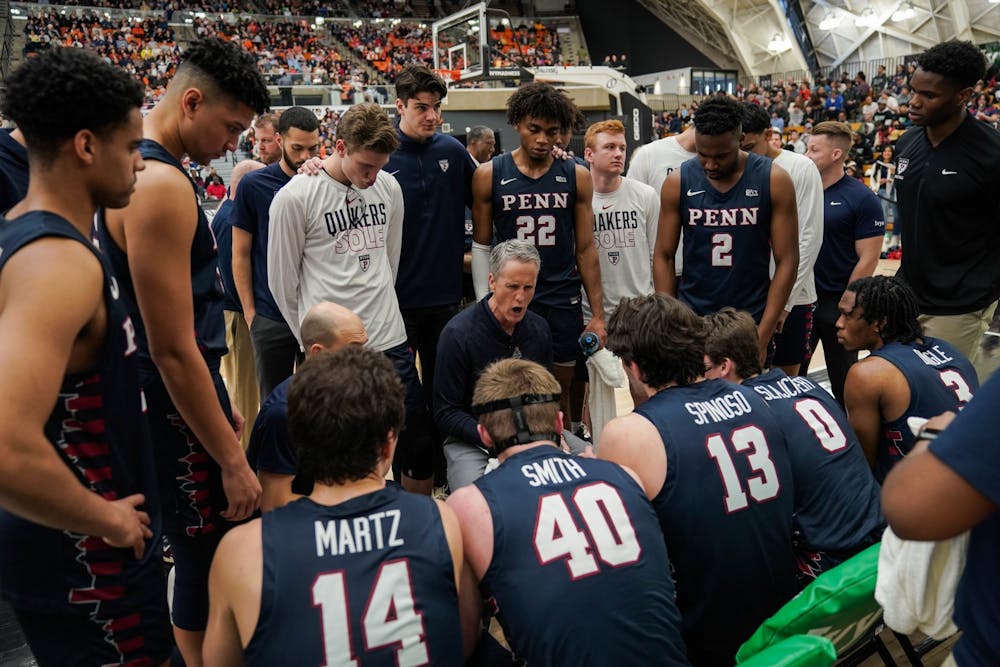"This is not a rivalry. They always kick our ass."
Those were the words of Philadelphia's most prominent basketball player — 76ers center Joel Embiid — in 2018. He said them about the Boston Celtics, but it could just as easily be true about Penn men's basketball and its relationship with That Team Up North: Princeton.
The Quakers have lost nine straight to the Tigers, and outside of a magical run in the 2017-18 season, haven't had sustained success against Princeton since George W. Bush was president. The losses have been tight, lopsided, and everything in between, but Penn simply has not been able to shake its nemesis to the north.
Rivalry games should be played on the biggest stages, when the most is at stake at the end of the season. This year, the Penn-Princeton rivalry embodied that, and the stage was set for the Quakers to finally slay their Tiger demons.
Last week, Penn came into Jadwin Gymnasium with a share of the Ivy League title on the line. What ensued was one of the best halves of basketball the team has played all season long. With 20 minutes to go in the regular season, Penn led by 17, was shooting over 50% from the field, and out-rebounding the Tigers — who were 14th nationally in rebounding margin during the season — 22 to 15. Junior guard Jordan Dingle was electric, with 21 points, and junior forward Max Martz hit two long-range shots.
But what followed after the break was nothing short of pathetic. Princeton came all the way back, capitalizing on long stretches of sluggish offense from Penn, to tie the game just before the end of regulation. And in overtime, the Quakers simply collapsed, only scoring three points and ultimately losing 77-69.
Princeton lifted a trophy on its home court. But Penn was still headed for the Ivy League Tournament. And once the day's games were finished and the seeding picture came into focus, Penn would have one last chance at redemption against their black-and-orange-striped foes from New Jersey.
Sure, it was just the semifinal, and whoever won would still have to play Yale to earn the automatic bid to March Madness. But who cares? The Miracle on Ice was also in a semifinal, but almost no one cares that the US still had to beat Finland to take home gold; all that matters is that we beat the Soviet Union for the first time in 20 years.
RELATED:
Penn men's basketball loses 77-70 heartbreaker to Princeton in Ivy League Tournament semifinal
Such was the setup for Saturday's game in the Ivy League Tournament Semifinal. And the game didn't disappoint. It was a tight, hard-fought, back-and-forth affair that had the 4500 in attendance on the edge of their seats. Each team's stars shone brightest in the tough moments, with Dingle scoring 19 while dishing out six assists, while junior guard Clark Slajchert and sophomore guard George Smith combining to go 6-10 from long range.
But in the end, you can run from it, you can dread it, but you can't escape it: Penn lost to Princeton, 77-70, its ninth straight defeat to the Tigers and arguably the one with the most on the line.
Such performances in the last two games of Penn's season naturally lead to a question of who's to blame. Is it coach Steve Donahue, who hasn't defeated the Tigers outside of that 2018 season? Is it the players? Is it a centuries-old curse lost to history which chose the past 15 years to rear its ugly head?
I'd prefer not to focus on those discussions, and instead remember the season that was. The Quakers had great stretches this year, including a seven-game Ivy win streak. But the team also had disappointing patches, including a 2-4 start to Ivy play, a 1-3 record against Big 5 rivals, and of course, three losses to Princeton.
The program will graduate four seniors, including one — guard Lucas Monroe — who started on Saturday. Each of the other three — guard Jonah Charles, forward Michael Moshkovitz, and center Max Lorca-Lloyd — were significant contributors during their Quaker careers, and all four will be missed dearly. But they will leave the Red and Blue without an Ivy title on their resumes.
I also want to take a way-too-early look ahead to next year. Penn will return four of Saturday's starters, and junior guard Andrew Laczkowski seems like a frontrunner to absorb many of Monroe's minutes. The starting backcourt of Clark Slajchert and Dingle will both be around for one last ride. There are promising young players who should see more action, as well as a class of recruits, including former Sixers coach Brett Brown's son, Sam.
Princeton will also be losing some of their best players, too, including Tosan Evbuomwan, who won Ivy League men's Player of the Year just a season ago. This should hopefully give Penn a chance to catch up.
With all this, the stage should be set for the Ivy League to run through the Palestra next year. But of course, that was supposed to happen this year, too. And if it doesn't, and if Penn still cannot beat Princeton, then it's time to start having serious conversations about the future of the program.









